Your 8th Week
You’re probably beginning
to feel different, even though you don’t look pregnant. You may feel a
bit low and irritable at times; this is largely due to the changing
levels of hormones in your body. You may sometimes have mixed feelings
about being pregnant, however much you long for a baby. If the idea of
going on vacation appeals to you, opt for short trips and a safe
climate, and take extra care of yourself.
NOTE
Your mood may swing from high to low as hormones and emotions take hold
Embryo at 8 weeks
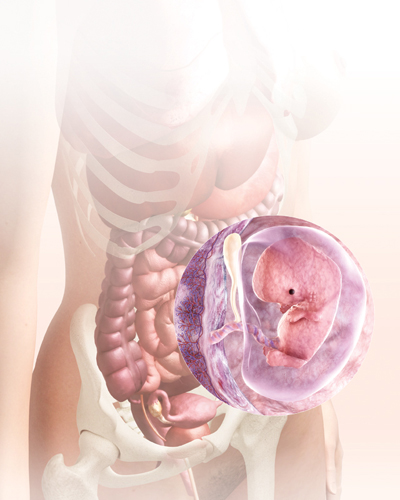
You are 7 Weeks and 1 Day 230 days to go…
As your body begins to change shape, you may begin to worry about gaining too much weight.
Your baby today
The fronds that will form the early placenta can be clearly seen
on the right here. At the bottom and separate from the embryo is the
yolk sac, which is becoming ever smaller as its role is taken over by
the placenta.
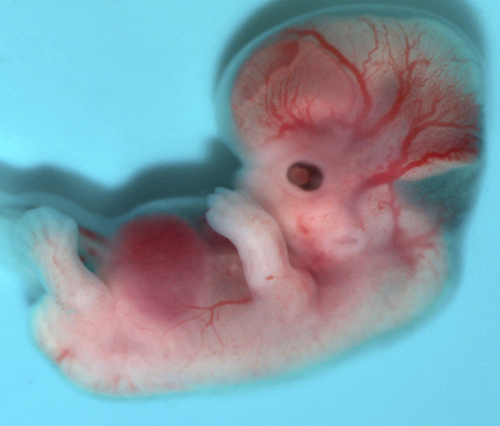
You’re supposed to put on weight
during pregnancy and while this is not a time to overeat, neither is it
a time for fad or restrictive diets. By eating sensibly and exercising
moderately, you should gain a healthy amount of weight during pregnancy.
How much weight you
should gain depends on your starting weight. If you are underweight when
you become pregnant, you should put on more weight than someone who’s
overweight. This starting weight is calculated by working out your BMI,
which is a measure of weight in relation to height. It’s a useful tool
to figure out approximately how much weight you should gain during your
pregnancy.
If your BMI falls
within the normal range, then your recommended pregnancy weight gain is
25–35 lb (11–14.5 kg). If your BMI is in the underweight category, you
should gain 28–40 lb (12.5–18 kg). If you’re overweight, your pregnancy
weight gain should be 15–25 lb (7–11 kg). Women in the obese category
should gain at least 15 lb (7 kg). Women carrying twins should plan to
gain about 35–45 lb (16–20 kg).
As a rough guide, an
ideal weight gain is no more than 5 lb (2.2 kg) in the first trimester;
no more than 12–19 lb (5.5–9 kg) in the second trimester; and no more
than 8–11 lb (3.5–5 kg) in the third trimester. Remember not all of this
weight gain is fat (see How much weight will you gain?).
How much weight will you gain?
Over the 40 weeks of pregnancy,
you are likely to gain very little weight in the first trimester and
then experience a steady weight gain of around 11/2–2 lb a week. In the
final few weeks of pregnancy, it’s normal to gain a few more pounds.
Remember that all figures given are averages and the amount you gain
will depend on many individual factors; where weight is gained can also
differ from woman to woman. Always consult your doctor if you’re
concerned about any aspect of your weight gain or diet.
Weight gain chart
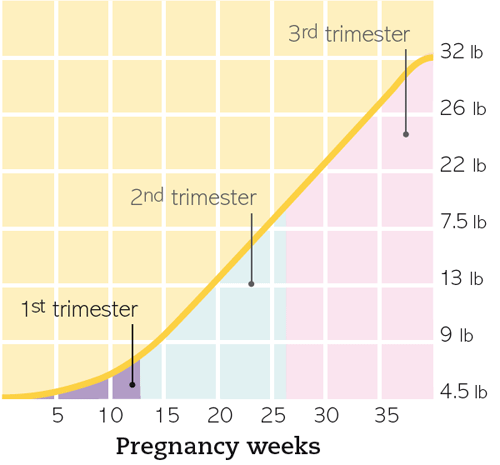
The weight you’ll gain during pregnancy
is a combination of your baby and her support system, the increased
size of your breasts and uterus, essential fat reserves, and additional
bodily fluids and blood.
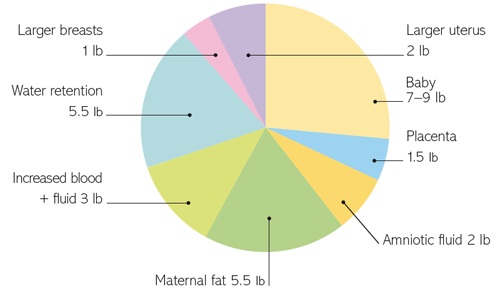
You are 7 Weeks and 2 Days 229 days to go…
Although your baby’s brain is still very simply formed, it’s undergoing some remarkable changes.
Your baby today
Your baby won’t look recognizably human yet, but the lower lip
and jaw are formed; the upper lip is not yet complete, and the mouth
appears very wide. The external ears are developing low down at the jaw
line and the eyes are wide apart.
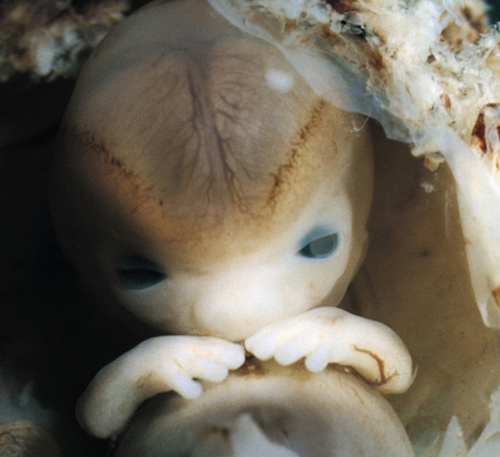
This is a really important stage of development for your baby.
At this time, her brain is a hollow structure, which is joined to the
spinal cord, but it’s now starting to fold and form five distinct areas.
The lowest part, or
hindbrain, is the first part to grow rapidly and will become structures
known as the pons, medulla, and cerebellum. These structures are the
most primitive areas of the brain and determine many basic actions that
we do without conscious effort, such as breathing and keeping our
balance.
Above this is the
midbrain that conveys signals from the hindbrain, peripheral nerves, and
spinal cord to the forebrain. This part of the brain consists of the
thalamus—involved with emotions and sensory perception—and the two
cerebral hemispheres, both quite smooth at this point. Each hemisphere
contains a fluid-filled chamber and within that the cerebrospinal fluid
is produced.
At the 11–14 week scan (see You are 11 Weeks and 2 Days), brain development checkups will be done to confirm that the baby has normal early cerebral development.
The dots that will form the eyes
are clearly visible now. At the side of the head, the deep cleft can be
seen between the front and back of the brain; this is normal at this
stage.
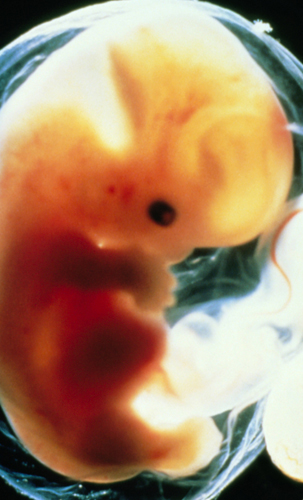
Fish really is brain food!
Research found that
six-month-olds whose mothers had consumed high amounts of fish during
pregnancy scored better in mental development tests. But only varieties
low in mercury should be eaten (see Know your fish).
… Doctor
| Q: |
I’m eight weeks pregnant and have had some bleeding. Should I be concerned?
|
| A: |
Bleeding in early pregnancy is common. If the bleeding is
light, and not accompanied by abdominal cramping or pain, then it’s
unlikely that there is anything wrong. However, always consult your
doctor if you have bleeding at any stage of pregnancy to rule out any
complications.
Bleeding in early
pregnancy can sometimes be due to a cervical ectropian, which is when
the surface of the cervix becomes “raw.” This results from hormonal
changes and is not harmful to the baby. Sexual intercourse can aggravate
a cervical ectropian, causing bleeding.
Bleeding in early
pregnancy can sometimes be due to a cervical ectropian, which is when
the surface of the cervix becomes “raw.” This results from hormonal
changes and is not harmful to the baby. Sexual intercourse can aggravate
a cervical ectropian, causing bleeding.
Bleeding in
late pregnancy may be more serious since it can be due to the placenta
partially, or totally, detaching from the wall of the uterus, known as
placental abruption, or to a low-lying placenta. If you have a mucus discharge tinged with blood in late pregnancy, this may be a “bloody show” . |